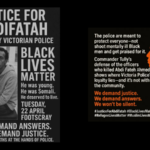Assaults, Extortion and Murder are Common Across Australian Prisons

Two men have been charged with the offences of murder and extortion over the death of Benn Schinkel at Queensland’s Capricornia Correctional Centre in Rockhampton last year.
The three men were inmates at the time Benn Schrinkel was found unresponsive, with serious injuries, in the activities centre of the correctional centre.
Other inmates were using the gym at the time.
Died as a result of prison violence
Police alleged Kenneth James and Leonard Stanley were standing over Benn Schrinkel for money, but Schrinkel is believed to have failed to comply with their demands.
Benn Schrinkel had only been in prison for a month when the bashing occurred.
He was transported to Rockhampton Hospital where he died a day later, on 22 October 2022, only a few months prior to being eligible for release on parole in January 2023.
Benn Schrinkel had been imprisonment for a dangerous driving incident. No one else was hurt when his car crossed to the wrong side of the road and collided with a semi-trailer, although Ben was left with ongoing injuries and a limp.
And while communities expect that people are sentenced in accordance with criminal wrongdoing with appropriate sentencing, there has been a lot of criticism aimed at the Queensland justice system over Benn Schrinkel’s death, including questions around the effectiveness of CCTV monitoring and general supervision in prison facilities which is supposed to stop inmate violence.
There has also been some discussion about whether the sentencing was too harsh. In New South Wales, it is possible in some cases to be sentenced to a non-custodial sentence such as an Intensive Correctional Order (ICO) for negligent driving or dangerous driving where there has been no harm caused to another person.
An ICO is an alternative to imprisonment, and offenders are monitored closely as they serve sentences within the community.
The charges
It has taken Queensland police 14 months to make arrests over Benn’s death. Kenneth James and Leonard Stanley are currently being held in the Waco Correctional facility, and neither has made an application for release on bail as this would presumably achieve very little given they are already incarcerated for other offences.
It is unlikely they would achieve bail ahead of any trial given the very serious nature of the charges they face.
Extortion
In New South Wales, there is no specific ‘extortion offence’, although there is an offence of blackmail in section 249K of the Crimes Act 1900 (NSW) which encompasses conduct such as an unwarranted demand with menaces for financial gain, and carries a maximum penalty in 10 years in prison.
In Queensland, the similar offence of extortion carries a penalty of 14 years imprisonment, which increases to life imprisonment in aggravated circumstances such as where serious injury is caused to another person.
Demanding property with intent to steal
The similar charge of demanding property with Intent to steal is outlined in section 99 of the NSW Crimes Act, which outlines the offence as where an accused person:
- Demands property from another person
- Does so with the intention to steal the property, and
- Uses menaces or force in the exercise of the demand.
For the purposes of the section, it is immaterial whether the menace involves violence or injury.
The maximum penalty is 10 years in prison and this increases to 14 years in prison where the offence occurred in the company of another person or persons.
A person is entitled to an acquittal if they had a ‘genuine claim of right’ over the money or property involved, meaning a genuine which means a legitimate belief they were legally entitled to it.
Duress and necessity are also defences to the charge.
Murder
Murder is an offence under section 18 of the Crimes Act 1900 which carries a maximum penalty of life in prison, and life imprisonment in New South Wales means for the term of a person’s natural life.
To establish the offence, the prosecution must prove beyond reasonable doubt that the defendant:
- Caused the death of another person,
- Did so by way of a voluntary act or omission,
- Did so with the intention to kill or inflict grievous bodily harm, or with reckless indifference to human life, or during or immediately after the commission of an offence punishable by a maximum penalty of 25 years in prison (constructive murder).
The most frequently used defence to charges of murder is self-defence.







